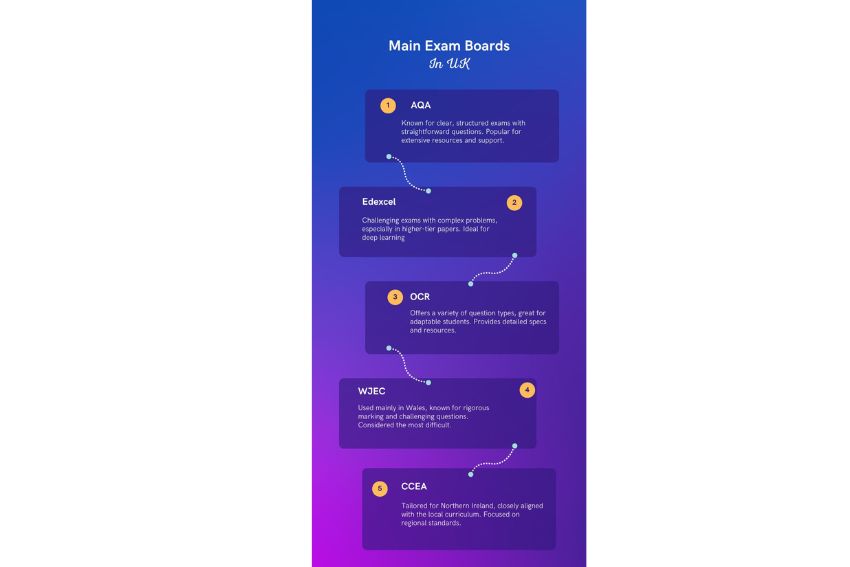GCSE Maths Exam Boards Explained: Which One Is Best?
Exam boards are organisations responsible for setting and marking exams, as well as awarding qualifications to students in various subjects, including GCSEs and A-Levels in the UK. These boards ensure that the exams are conducted fairly and that the results are consistent across all students, regardless of their school or location.
Each exam board creates its own specifications for the subjects they offer, which include details about the curriculum, types of questions, and the grading system. Schools can choose which exam board they want to use for each subject, depending on their preferences and the needs of their students.

Overview of GCSE Maths Exam Boards
In the UK, GCSE Maths is assessed by several exam boards, each with its own structure and approach. The main exam boards are AQA, Edexcel, OCR, and WJEC. These boards ensure that exams are fair and consistent across all students, regardless of their location or school.
AQA and Edexcel are the most widely used exam boards. Both have a similar structure with three papers: one non-calculator and two calculator papers, each lasting 90 minutes. OCR also follows this format but allocates a higher total number of marks, which may affect grading dynamics.
Each exam board follows the same national curriculum guidelines set by the Department for Education, ensuring that all students cover the same topics. However, the style of questions, the presentation of papers, and the specific resources available can differ between boards. For example, Edexcel may present its higher-tier content differently from AQA, making it crucial for students to familiarise themselves with the specific format used by their exam board.
When choosing the right exam board, you should consider various factors, including school preference and student strengths. Students often struggle most with algebra across all exam boards, regardless of which one they’re studying under – understanding the fundamentals of GCSE algebra can make a significant difference in overall performance and confidence. Additionally, it’s important to consult with teachers to understand which board best suits a student’s learning style and exam preparation needs. Many students find working with specialised KS3 maths tutors beneficial during the crucial years before GCSE, as these tutors can provide personalised support in building the strong mathematical foundation needed for success with any exam board later on.
This overview provides a snapshot of the key GCSE Maths exam boards, offering insight into what students and educators can expect from each.
Assessment Objectives and Exam Content
Ofqual structures GCSE Maths exams around specific assessment objectives, ensuring consistency across all exam boards, including AQA, Edexcel, OCR, and WJEC. These objectives evaluate a range of mathematical skills and knowledge, which students must demonstrate in their exams.
- Assessment Objective 1 (AO1): Use and Apply Standard Techniques
This objective focuses on students’ ability to recall facts, use mathematical notation correctly, and carry out routine procedures. It tests the foundational skills necessary for solving basic mathematical problems, such as arithmetic operations, algebraic manipulations, and basic geometry. - Assessment Objective 2 (AO2): Reason, Interpret, and Communicate Mathematically
AO2 is about students’ ability to reason and make logical deductions. It involves interpreting data, constructing mathematical arguments, and presenting solutions clearly. This objective often requires students to engage in multi-step problem-solving, where they must connect different areas of mathematics to arrive at a solution. - Assessment Objective 3 (AO3): Solve Problems within Mathematics and in Other Contexts
AO3 evaluates a student’s ability to apply mathematical knowledge to solve complex problems, both within mathematics and in real-world contexts. This includes translating problems into mathematical terms, using appropriate methods to solve them, and evaluating the results.
Exam Content Across Different Boards
The exam content for GCSE Maths is largely consistent across all boards due to the national curriculum guidelines. However, there are differences in how this content is presented and weighted.
- AQA and OCR typically present their content in user-friendly tables, making it easier for students to identify the key areas of focus. In contrast, Edexcel differentiates higher-tier content by using bold font, which helps students quickly recognise the more challenging topics.
- The weighting of topics can vary slightly between boards, especially when comparing Foundation and Higher tiers. For example, some boards might place more emphasis on algebra, while others might focus more on geometry or statistics.
Understanding these assessment objectives and the specific content focus of each exam board can help students prepare more effectively, ensuring they are ready to tackle the full range of questions they might encounter in their exams. This alignment with top-ranking blogs’ strategies—providing clear, targeted information—can enhance both the reader’s experience and the blog’s search engine performance.

Which Exam Board did you Choose?
The primary exam boards in the UK are – AQA, Edexcel, OCR, WJEC and CCEA. This exam boards set the exam in all UK except Scotland. There are little differences in how they operate exams.
- AQA (Assessment and Qualifications Alliance)
- Edexcel (Pearson Edexcel)
- OCR (Oxford, Cambridge and RSA Examinations)
- WJEC (Welsh Joint Education Committee)
- CCEA (Council for the Curriculum, Examinations & Assessment)
AQA
- Duration: 4 hours, 30 minutes
- Number of papers: 3
- Number of marks available: 240 (80 per paper)
Edexcel
- Duration: 4 hours, 30 minutes
- Number of papers: 3
- Number of marks available: 240 (80 per paper)
OCR
- Duration: 4 hours, 30 minutes
- Number of papers: 3
- Number of marks available: 300 (100 per paper)
WJEC
- Duration: 4 hours, 30 minutes
- Number of papers: 2
- Number of marks available: 240 (120 per paper)
CCEA
- Duration: 4 hours, 30 minutes
- Number of papers: 2
- Number of marks available: 400 (140, 160, 100.)
Which is Easiest Exam Board?
In particular every exam board is same difficulty. But after some research students consider AQA to be easiest one. Many students find AQA’s exams more accessible due to their clear structure and straightforward progression from easier to more challenging questions. The consistency in question style and the inclusion of multiple-choice questions also make AQA exams feel more manageable for a wide range of students.
Which is the Hardest Exam Board?
WJEC is considered the hardest GCSE Maths exam board, particularly when looking at statistics related to grade attainment. Here’s why
- Difficulty in Achieving Top Grades: WJEC is known for its rigorous marking scheme and challenging exam content. Statistical evidence shows that fewer students achieve the highest grades (Grade 7 and above) under WJEC compared to other exam boards like AQA or OCR.
- Comparative Rigour: Compared to other boards, WJEC exams tend to be more demanding, making it harder for students to achieve top marks. This has led to the perception that WJEC is the most challenging board, especially for those aiming for the highest grades.
Which Exam board is Best
There is not one best exam board. Every exam board have their particular strategies and everyone of them have their best sides. For you to better understand it look at this statistics.
1. AQA (Assessment and Qualifications Alliance)
- Best For: Students who prefer a clear, structured exam with a consistent progression from easier to more challenging questions.
- Why: AQA is known for its straightforward questions, making it easier for students to build confidence as they work through the exam. The extensive support materials and multiple-choice questions also make AQA accessible to a wide range of students.
2. Edexcel (Pearson Edexcel)
- Best For: Students who excel in problem-solving and are comfortable with more complex, multi-step questions.
- Why: Edexcel is often considered more challenging due to its question style, but this can be advantageous for students aiming for high grades, especially those who thrive on complex problems.
3. OCR (Oxford, Cambridge and RSA Examinations)
- Best For: Students who appreciate variety in question types and are adaptable in applying mathematical concepts.
- Why: OCR offers a wide range of question types, which can be beneficial for students who are strong in reasoning and interpreting information in different formats.
Revision Resources and Past Papers
For effective GCSE Maths revision, having access to quality past papers is crucial. Past papers allow students to practice exam-style questions and get familiar with the format and timing of the actual exams.
Past papers from exam boards
For those looking for personalised support, Edumentors is an excellent platform that connects students with tutors from top UK universities. These tutors can provide tailored guidance, helping students focus on areas that need improvement and making the most out of their revision time. Edumentors also offers customised revision strategies and can guide students through past papers, ensuring they understand the marking schemes and common pitfalls.
FAQs
Are the GCSE Maths exams different across exam boards?
Yes, while the core content is similar due to the national curriculum, the structure, style of questions, and mark allocation can vary between boards.
Can I switch exam boards if I’m struggling with the current one?
Generally, once your school has chosen an exam board, it’s challenging to switch. However, if there are significant concerns, discuss this with your teacher or school administration.
Can universities see which exam board I took for GCSE Maths?
Universities typically do not focus on the exam board but rather on the grades achieved. However, some competitive courses might consider the exam board in the context of overall academic performance.
What is the most popular maths GCSE exam board?
The most popular GCSE Maths exam board in the UK is AQA (Assessment and Qualifications Alliance). AQA is widely used across schools in England and is known for its clear structure and extensive resources, making it a preferred choice for both teachers and students.
Another popular exam board is Edexcel (Pearson Edexcel), which is also widely adopted due to its comprehensive resources and support materials, particularly for higher-tier students. Both AQA and Edexcel are often cited as the most commonly used exam boards for GCSE Maths in various schools across the UK.
Conclusion
Choosing the right GCSE Maths exam board is an important decision that can significantly impact a student’s performance and confidence. Each exam board—AQA, Edexcel, OCR, WJEC, and CCEA—offers a unique approach to assessing students, with differences in question style, exam structure, and grading rigor.
While WJEC is often considered the hardest due to its challenging content and rigorous marking scheme, AQA is seen as the most accessible, providing a clear and structured approach that many students find manageable.
By combining the right resources, understanding the differences between exam boards, and utilising personalised tutoring through platforms like Edumentors, students can approach their GCSE Maths exams with confidence and the best chance of success.








